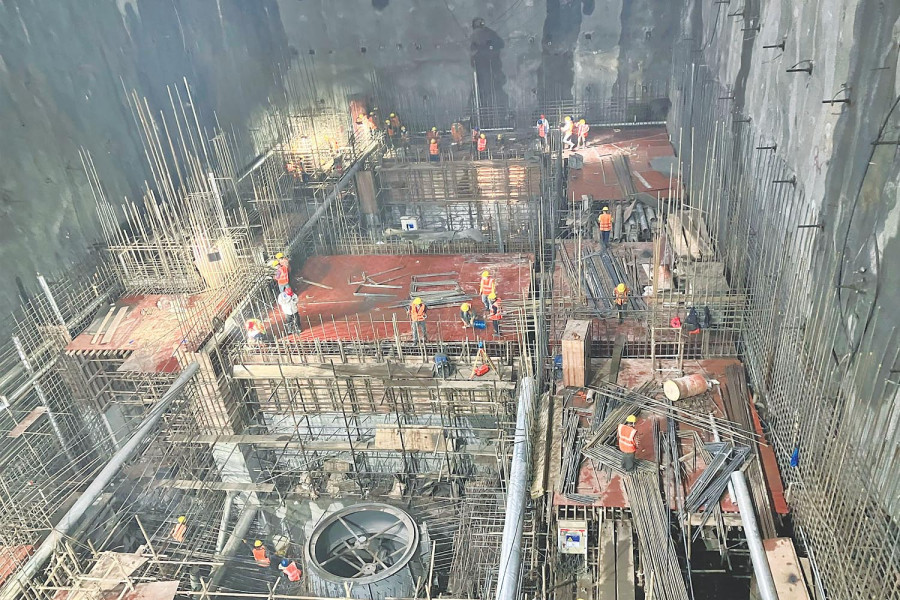National
Nepal linked to India’s real-time energy trade
Bar to hydropower projects with Chinese or Pakistani involvement remains in place.
Prithvi Man Shrestha
India has opened a door for its neighbours including Nepal to participate in the real-time energy market in addition to the existing access to the day-ahead market.
This allows Nepal to either sell or buy power in India’s energy exchange market as per the requirement, in real time. In the day-ahead market (DAM), the prices and quantity of electricity are determined a day before the actual physical trading.
Nepal had been seeking access to the real-time market (RTM) in order to avoid the spillage of electricity.
By amending the Procedure for approval and facilitating Import/Export (Cross Border) of Electricity by the Designated Authority issued in February 2021, the Central Electricity Authority under India’s Power Ministry granted Nepal as well other neighbours such as Bhutan and Bangladesh access to its real-time power market.
The amendment notice issued on July 31 states any Indian power trader, on behalf of any entity of a neighbouring country, may trade at Indian Power Exchanges (DAM/RTM/Both DAM and RTM segment), after obtaining approval from the designated authority, up to the specified quantum (megawatt) and duration.
Earlier, the option of giving access to the real-time market was kept open, but no provision for it had been guaranteed.
As per the earlier provision, any Indian power trader, on behalf of any entity of a neighbouring country, may trade in Indian power markets, after obtaining approval from the designated authority, up to the specified quantum and duration.
Such market access will only be available to the entity on behalf of whom the Indian power trader is trading. Likewise, the generating asset from which power is being traded should also be owned/controlled by the neighbouring country having an agreement on power cooperation with India.
The amended procedure has changed nothing in the provision which denies market access to projects with any involvement of Chinese or Pakistani entities.
“The Nepal Electricity Authority may benefit from it both in the import and export of power when there is a sudden rise or fall in demand,” said Prabal Adhikari, power trade director at the state-owned Nepal Electricity Authority (NEA). “It can be beneficial even when a sudden outage takes place at a certain power project.”
He said that based on the template of the application request, Nepal could sell power generated from a single project in both the day-ahead and the real-time markets. “It has opened the door for us to sell power from 10 hydropower projects which have so far got approvals from the Indian authorities to trade in the two markets,” he added.
When there was access to only the day-ahead market, Nepal would be forced to sell committed power to the buyers even when the country faced power outages due to disruption in the power supply system within the country.
“We can sell more than the earlier estimated amount if the generation rises suddenly, as long as there is access to the real-time market,” said Suresh Bhattarai, a spokesman at the NEA. “The buyer also can reduce demand if it no longer feels the need to buy power. It is a win-win for both the buyer and the seller.”
Nepal, which has to buy power from India during the dry season, can buy power from the Indian market in real-time. “We can transact power by submitting bids an hour and 15 minutes prior to the actual trading in the real-time market,” said Adhikari.
In fact, the southern neighbour had notified that it was working to allow Nepal to participate in the real-time market during a meeting of the Joint Steering Committee in February. Five months later, the Indian side granted access to the real-time market to neighbouring countries.
Private sector participants said India’s opening of a new window for selling and buying power is a positive development but it would not guarantee long-term market access to Nepal’s electricity.
“Only when we start signing long-term trade deals with the Indian companies for selling power in the Indian market, will it make a fundamental difference, as that would encourage more investment in Nepal’s power sector,” said Ashish Garg, vice-president of the Independent Power Producers’ Association of Nepal. “The time has come to bring clarity to the yet-to-be-signed 25-year inter-governmental agreement on power trade.”




 8.54°C Kathmandu
8.54°C Kathmandu















